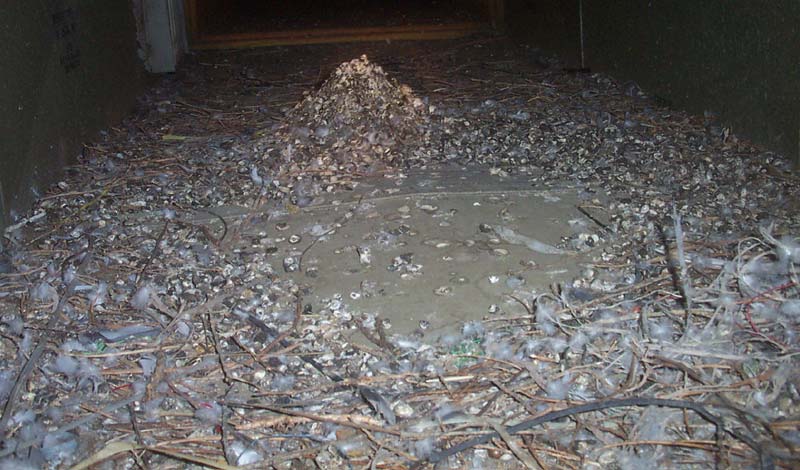
by Pigeon Patrol | Jun 30, 2023 | Bird Spike, Pigeon Spikes, Pigeons, Pigeons in the News, Raccoons, Sparrows, UltraSonic Bird Control
Q: I live on the 15th floor of an Upper East Side co-op with windows facing First Avenue. Pigeons are roosting on my window ledge. The birds’ vocalization is loud enough to wake me up in the morning and they leave behind gray and white stains from their droppings. I shoo the birds away when I’m home, but cannot do this all day. I want to be able to open my window in the spring without worrying that the germs from their droppings will enter my room. What can I place on my window ledge to discourage the pigeons from roosting there? I do not want to use anything that could fall off the ledge, endangering a pedestrian below, or poison the birds. What is a safe remedy?
A: You should be able to open your windows this spring without worrying that a pigeon will fly into your apartment or its droppings will soil your home. While their droppings do not generally pose a serious health risk, they are still unsanitary, and gross. But your building, not you, should get the birds off your ledge. As a shareholder, you are responsible for everything inside the walls of your apartment, and the co-op board is responsible for the building. So the board needs to figure out how to get the birds to find a new home.
“Residents should not attempt a solution on their own,” said Daniel Wollman, the chief executive of Gumley Haft, a Manhattan property manager.
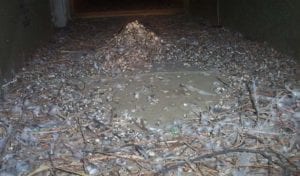
Write the managing agent and the co-op board a letter alerting them to the pigeon problem and insisting that they fix it. If the birds are nesting on your ledge, they are probably nesting on another resident’s, too. In the letter, ask that management also clean the ledge of any droppings.
The building should be able to get the birds to nest elsewhere without damaging the facade or risking the safety of anyone on the street below. For example, at a Gumley Haft-managed property with a pigeon problem in its inner courtyard, management suspended netting over the area to keep the birds away.
Netting will not solve the problem at your building, but there are other methods. John McGowan, the director of operations for Bugged Out Pest Management in Brooklyn suggested that your building consider using Bird Barrier Optical Gel, a bird deterrent, which he described as “awesome.”
Source
Pigeon Patrol Products & Services is the leading manufacturer and distributor or bird deterrent (control) products in Canada. Pigeon Patrol products have solved pest bird problems in industrial, commercial, and residential settings since 2000, by using safe and humane bird
deterrents with only bird and animal friendly solutions. At Pigeon Patrol, we manufacture and offer a variety of bird deterrents, ranging from Ultra-flex Bird Spikes with UV protection, Bird Netting, 4-S Bird Gel and the best Ultrasonic and audible sound devices on the market today.
Voted Best Canadian wholesaler for Bird Deterrent products ten years in a row.
Contact us at 1 877-4-NO-BIRD,(604) 585-9279 or visit our website at www.pigeonpatrol.ca
Pigeon/Pigeon Patrol / Pigeons Roosing / Vancouver Pigeon Control / Bird Spikes / Bird Control / Bird Deterrent / PIgeon Deterrent / Surrey Pigeon Control / Pest / Seagull deterrent / Vancouver Pigeon Blog / Birds Inside Home / Pigeons in the cities / Ice Pigeons / What to do about pigeons / sparrows, Damage by Sparrows, How to Keep Raccoons Away, Why Are Raccoons Considered Pests / De-fence / Pigeon Nesting / Bird Droppings / Pigeon Dropping / woodpecker control / Professional Bird Control Company / Keep The Birds Away / Birds/rats/seagull/pigeon/woodpecker/dove/sparrow/pidgeon control/pidgeon problem/pidgeon control/flying rats/pigeon problems/ bird netting/bird gel/bird spray/bird nails/bird guard
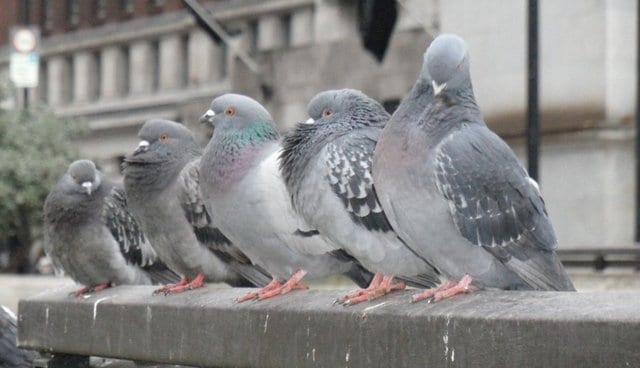
by Pigeon Patrol | Jun 30, 2023 | 4-S Gel Bird repellent, Animal Deterrent Products, Bird Deterrent Products, Bird Law, Bird Netting, Bird Spikes
Pigeons may seem harmless, but these pest birds cause millions of dollars in damage every year to buildings, ventilation systems, machinery, statues, roofs, and much more. Bird droppings and nesting materials left by pigeons pose physical problems and health hazards that can become very serious if not corrected quickly making prompt and effective professional bird control is often essential.
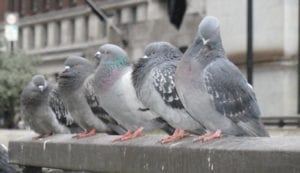
Potential Health Hazards:
There are many health risks associated with pigeons and their droppings. The bacteria, fungi, and ectoparasites that they and their droppings harbor are numerous. The four most common ways disease is passed by bird to human are: inhalation of fecal dust, food and water contaminated with bird feces, direct contact with feces, and parasitic transfer.
Pigeon droppings can expose humans to many diseases, including salmonella, Newcastle disease, candidiasis, encephalitis, orthosis, and toxoplasmosis. In addition, they can also carry cryptococcosis, and coccidiodomycosis, which cause meningitis. The droppings may also harbor growth of fungus, which causes histoplasmosis. Fleas, lice, mites, and other pests often live on these birds, hitching a ride to where ever they want to jump off. Pigeons may also attract other pests, such as rats, which feed on dead pigeons and food that well-intentioned bird lovers may scatter for them.
In addition to disease, bird droppings are known for triggering people to slip and fall, which makes it especially important to rid the birds from highly trafficked areas.
Damage Caused by Pigeons:
These are messy birds, leaving droppings everywhere they go, particularly near their roost sites. Pigeon droppings are not just gross, they are also full of uric acid which makes them extremely corrosive. The droppings are the direct cause of millions of dollars in damage to buildings and other structures. Particularly vulnerable are painted surfaces, awnings, signs, and other similar surfaces. A tragic example of the corrosiveness of pigeon droppings is the Minnesota bridge accident in 2007, which was found to be the direct result of bird droppings eating away at the metal bridge supports until they weakened.
In addition to the damage cause by their acidic droppings, pigeon nests can also cause damage. Pest birds will often build nests in gutters or on roof corners blocking essential drainage systems. Every year several warehouses experience roof damage, and even collapse, when drainage systems have been blocked and standing water rises just six inches. Bird nests can also block ventilation systems, which not only prevents exhaust of potentially harmful gases, but also has the potential to spread diseases. Fire is also a potential hazard. Nesting materials are usually flammable, consisting of twigs, straw, grasses and dried droppings. When pest birds build their nests inside electric signs or other machinery there is a great risk of fire.
Pigeons are creatures of habit and highly social. Once they have found a cozy spot the will return again and again, bringing along more of their pigeon pals. Prolific breeders, pigeons can hatch several broods a year, sometimes even laying a new clutch before the previous have even hatched. Often our buildings and structures have architectural features such as drain spouts and eaves that make perfect nesting spots for these birds. Pigeons are comfortable around humans and they’re hard to scare away or deter. Once a flock of stubborn unwanted pigeons have set up shop in/on your building, it can be stubbornly resistant to removal, often requiring the services of a pest control or animal control professional. As is true of many pests that invade our homes and businesses, the first step to controlling feral pigeons is to remove their food source.
Tips to deter pigeons:
- Don’t feed the pigeons.
- Screen drains and gutters to make your property less attractive to pigeons.
- Encourage children to pick up spilled food – and teach them NOT to feed pigeons
- Keep areas around trash bins and outdoor dining areas clean
- Eliminate water sources such as bird baths, over-watered lawns, or kiddy pools.
Source
Pigeon Patrol Products & Services is the leading manufacturer and distributor or bird deterrent (control) products in Canada. Pigeon Patrol products have solved pest bird problems in industrial, commercial, and residential settings since 2000, by using safe and humane bird
deterrents with only bird and animal friendly solutions. At Pigeon Patrol, we manufacture and offer a variety of bird deterrents, ranging from Ultra-flex Bird Spikes with UV protection, Bird Netting, 4-S Bird Gel and the best Ultrasonic and audible sound devices on the market today.
Voted Best Canadian wholesaler for Bird Deterrent products ten years in a row.
Contact us at 1 877-4-NO-BIRD,(604) 585-9279 or visit our website at www.pigeonpatrol.ca
Pigeon/Pigeon Patrol / Pigeons Roosing / Vancouver Pigeon Control / Bird Spikes / Bird Control / Bird Deterrent / PIgeon Deterrent / Surrey Pigeon Control / Pest / Seagull deterrent / Vancouver Pigeon Blog / Birds Inside Home / Pigeons in the cities / Ice Pigeons / What to do about pigeons / sparrows, Damage by Sparrows, How to Keep Raccoons Away, Why Are Raccoons Considered Pests / De-fence / Pigeon Nesting / Bird Droppings / Pigeon Dropping / woodpecker control / Professional Bird Control Company / Keep The Birds Away / Birds/rats/seagull/pigeon/woodpecker/dove/sparrow/pidgeon control/pidgeon problem/pidgeon control/flying rats/pigeon problems/ bird netting/bird gel/bird spray/bird nails/bird guard
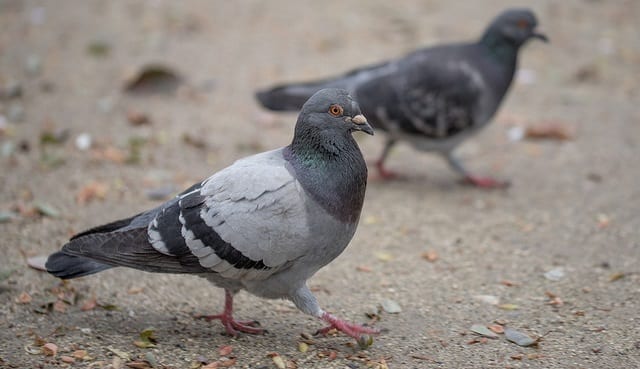
by Pigeon Patrol | Jun 21, 2023 | MBCA, pet bird, Pigeon Control, Pigeon Droppings, Pigeon Patrol's Services, Pigeon Predators
Pigeons are a very common species of bird in India. Pigeons can breed upto 8 times a year, therefore they are found everywhere. The word ‘pigeon’ comes from the Latin word called ‘pipio’, meaning ‘young chirping bird’. These young chirping birds love to create a mess and leave stinky droppings everywhere and anywhere.
Pigeons can sometimes be hard to deal with as they always wander in groups. They can mess your balcony or your vehicle. They can make consistent distracting noises which can give you a headache. They barge in your house and do not know how to leave. Pigeon droppings and nests can stink up a place. They can clog pipes, water-spouts etc. Read on to get rid of pigeons and their belongings.
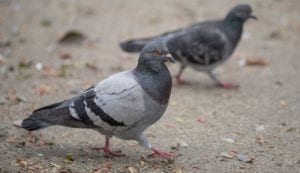
How to get rid of pigeons:
In India, pigeons are protected under Section 428 and 429 of the Indian Penal Code(IPC) (no wonder they are fearless). Even if this was not the case one must always go for non-violent options. So here is a list of the ways in which you can get rid of pigeons and their poop
Sound distraction:
You can hang wind-chimes at places prone to pigeons. They do not like it and as the chime moves and makes sound with the wind it kind of keeps the pigeons away and gives you a pigeon-free and melodious surrounding.
Reflecting surfaces:
Use shiny materials like aluminum foil or mirror to confuse the pigeons and keep them at bay. It plates tricks with their senses and keeps them off the place.
Professional bird nets or covering:
Pigeon nets for balconies are advised but try buying nets with smaller gap holes to avoid any invasions of pigeons.
Pigeon repellents:
You can use organic, home-made pigeon repellents. It can be effective in keeping pigeons away from the balcony or windows. (Providing you with a comparatively clean floor.)
Cover things up:
Pigeons can create a lot of mess out of open trash bins. Keep your trash covered if it is kept in an accessible place for pigeons to avoid any spill and mess.
Pigeons are not pets:
Pigeons are not pets and don’t treat them like one. Discourage people from feeding these nasty, parasite-carrying pigeons to stop them from coming back. Do not make them habitual of a place they can get food from as it will also become a place they use for frequent stinky white droppings.
Introduce fear:
It is said that pigeons are sort of taken aback by owls and snakes. You cannot get a real one but you can get a plastic owl or a rubber snake for your balcony or workspace, keep them in a corner most visited by the pigeons. It is a short-term trick to get rid of the pigeons.
Source
Pigeon Patrol Products & Services is the leading manufacturer and distributor or bird deterrent (control) products in Canada. Pigeon Patrol products have solved pest bird problems in industrial, commercial, and residential settings since 2000, by using safe and humane bird
deterrents with only bird and animal friendly solutions. At Pigeon Patrol, we manufacture and offer a variety of bird deterrents, ranging from Ultra-flex Bird Spikes with UV protection, Bird Netting, 4-S Bird Gel and the best Ultrasonic and audible sound devices on the market today.
Voted Best Canadian wholesaler for Bird Deterrent products ten years in a row.
Contact us at 1 877-4-NO-BIRD,(604) 585-9279 or visit our website at www.pigeonpatrol.ca
Pigeon/Pigeon Patrol / Pigeons Roosing / Vancouver Pigeon Control / Bird Spikes / Bird Control / Bird Deterrent / PIgeon Deterrent / Surrey Pigeon Control / Pest / Seagull deterrent / Vancouver Pigeon Blog / Birds Inside Home / Pigeons in the cities / Ice Pigeons / What to do about pigeons / sparrows, Damage by Sparrows, How to Keep Raccoons Away, Why Are Raccoons Considered Pests / De-fence / Pigeon Nesting / Bird Droppings / Pigeon Dropping / woodpecker control / Professional Bird Control Company / Keep The Birds Away / Birds/rats/seagull/pigeon/woodpecker/dove/sparrow/pidgeon control/pidgeon problem/pidgeon control/flying rats/pigeon problems/ bird netting/bird gel/bird spray/bird nails/bird guard
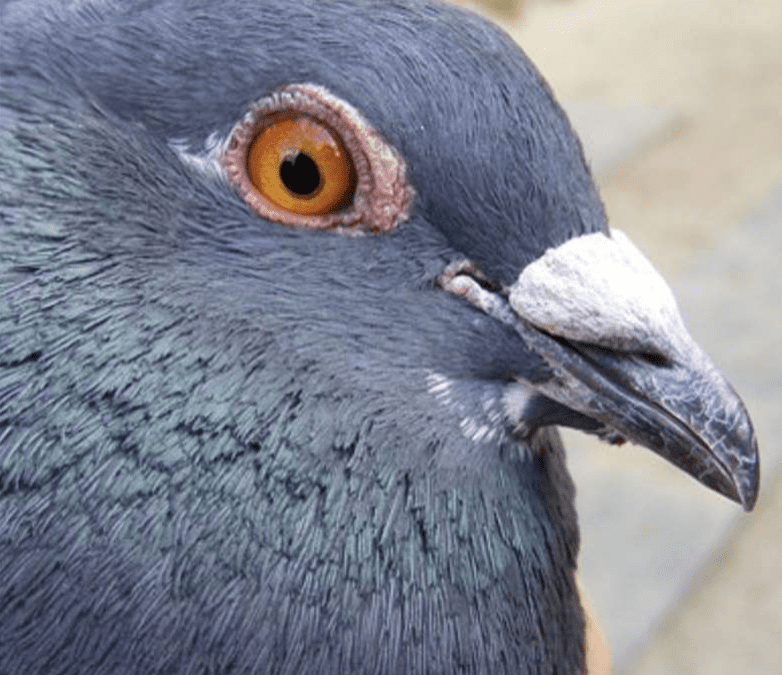
by Pigeon Patrol | Jun 21, 2023 | Bird Spike, Pigeon Predators, Pigeon Spikes, Pigeons, Pigeons in the News, Raccoons, Sparrows
A pigeon takeover can really disrupt your outdoor space. One day you see a few, the next day, a few hundred. Not to mention their droppings can stain or even corrode metal and painted surfaces.
Getting rid of pigeons starts with finding the root cause and planning your defense strategy accordingly. Here’s what could be attracting them and how to humanely get rid of them.
Why Do I Have Pigeons Around My Home?
Especially if you’re not in an urban location, it can be a mystery why pigeons have chosen to flock to your home. Despite their well-known tendency to inhabit cities, pigeons can be found just about anywhere, from large farmlands to small suburban apartments.
These are the main culprits that could be attracting pigeons to your home.
1. There’s a Feast Around
Above all, the pigeon’s main objective is to eat—and their peckish beaks will go for just about anything. They might go for the crops around your home, such as fruits (especially berries), grains, and beans.
If you have a bird feeder, they’ll bully smaller birds away and call upon their pigeon pals to come gorge. There could also be some trash can or compost munchies they’re going after.
Not sure what’s giving them a meal ticket? It helps to observe the pesky birds and note where they gather. Once you pinpoint what they’re pecking at, it will be that much easier to remove the temptation.
2. There’s a Good Perching Spot
Pigeons love a birds-eye view of the surrounding area—what better way to scope out a place to feed or nest? If you’ve got some prime perching real estate around, they’ll be all the more attracted to your property.
Here are a few of their top picks for perching:
- Ledges
- Balconies
- Gutter
- Roof
3. There’s a Suitable Nesting Area
Aside from eating, nesting is a pigeon’s other main objective. They prefer flat, warm, secluded surfaces such as:
- Barns
- Chimneys
- Garages
- Window sills
- Window AC units
- Solar panels
How to Get Rid of Pigeons
Whether it’s the noms or the nesting that has pigeons hooked on your turf, here’s what you can do to keep them away.
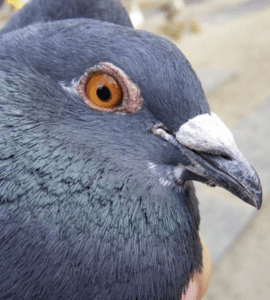
Adjust Your Bird Feeders
Bird feeders are a major attraction to pigeons, but that doesn’t mean you need to bid farewell to all your hungry feathered visitors. By getting feeders pigeons can’t (or don’t want to) access, your favorite songbirds can have their seed and eat it too.
Get a Weight-Sensitive Feeder
Weight-sensitive bird feeders are a great pigeon deterrent (and they’ll also keep ravenous squirrels at bay). These allow lightweight songbirds to munch freely while using weight-sensitive springs to shut feeding ports for pigeons and other heavier visitors.
Use Pigeon-Proof Feeders
Pigeons are large and heavy—and they’re no acrobats. You can deter them by selecting a feeder they can’t use, such as a hanging tube feeder, suet cake, or anything with tiny perches that they won’t be able to sit on.
Put Out Food They Don’t Like
As undiscerning as the pigeon’s appetite is, there are some seeds they tend to stay away from. Here are a few songbird-attracting seeds that pigeons don’t care for:
- Suet
- Nyjer
- Striped sunflower
Avoid the Food They Do Like
In the same vein, you’ll want to avoid the seeds that pigeons find scrumptious, which are often found in less-expensive seed mixes. These include:
Use a Seed Catcher
Those pretty songbirds aren’t the neatest eaters, and pigeons will happily flock to any seed that falls to the ground. If you’re having trouble in this area, consider adding a seed catcher, which is a wide tray that hangs just below the feeder. You can purchase a seed catcher online or attach a tray to your feeder with rope or chains.
Get Anti-Roosting Spikes
Anti-roosting spikes might seem painful at a glance, but they’re more of a visual deterrent than a physical one. Since birds can easily see the spikes, they know they aren’t able to perch and won’t try to do it.
Use a Fearsome Decoy
To keep pigeons away, try putting out a realistic decoy of a predatory animal, such as a snake or an owl. Pigeons tend to wise up to this tactic after a while, so it’s more effective if you move the decoy to different spots periodically. Even still, this is best paired with other solutions and deterrents.
Try a Repellent
Ultrasonic emitters and slippery gel repellents can keep pigeons from hanging out in your yard. However, the downside is that they’ll keep other birds away too. Avoid sticky repellents, as these can trap and injure smaller birds.
Tips for Dealing With Pigeons Around Your Home
While you’re working on giving them the permanent boot, use these tips to manage the pigeons around your home.
1. Don’t Feed the Birds
When pigeons disrupt the feeding of your regular songbird clientele, it’s tempting to throw some bread or cheap seed in a separate location as a diversion. While this presents a temporary solution, you’ll run into trouble when those pigeons tell their buddies about the free food and they all make it a regular place to frequent.
Along with that, be sure to close off or remove other potential food sources, such as trash cans and compost piles.
2. Keep a Consistent Cleanup Routine
While you’re in the midst of a pigeon problem, become well-acquainted with your hose’s power-spray setting. Their corrosive droppings can do serious damage to the surfaces and finishes around your yard, so you’ll want to stay on top of cleanup. Along with that, sweeping and keeping garbage in well-sealed containers can eliminate potential food sources.
3. Deter Pigeons With Reflective Materials
Shiny materials are disorienting and can keep pigeons away from their usual landing spot. Aluminum foil, reflective tape, shiny ribbon, and your old CD collection are all great options.
4. Cap Your Chimney
While it won’t single-handedly prevent a pigeon invasion, investing in a chimney cap is a wise thing to do if you haven’t already. Pigeons have a tendency to nest in chimneys, where they can often get stuck and pass away. That’s not ideal for either of you to go through, so you won’t regret being proactive.
DIY vs. Hire a Pro
Although the risk of pigeon-related illness is low, these birds can harbor disease and parasites. A local bird control service can help you safely deal with them and keep them from coming back. The cost to remove a bird’s nest ranges anywhere from $100 to $2,000.
If you decide to DIY, it’s best practice to wear protective clothing, including eyewear, a mask, and gloves when handling a bird or its droppings.
Additional Questions
How do I get rid of pigeons naturally?
Here are a few scents pigeons can’t stand:
- Cinnamon
- Hot peppers
- Peppermint
- Onion
- Garlic
What are pigeons most afraid of?
Pigeons are most deterred by the sight of predatory birds. These include owls, hawks, and other birds of prey.
Source
Pigeon Patrol Products & Services is the leading manufacturer and distributor or bird deterrent (control) products in Canada. Pigeon Patrol products have solved pest bird problems in industrial, commercial, and residential settings since 2000, by using safe and humane bird
deterrents with only bird and animal friendly solutions. At Pigeon Patrol, we manufacture and offer a variety of bird deterrents, ranging from Ultra-flex Bird Spikes with UV protection, Bird Netting, 4-S Bird Gel and the best Ultrasonic and audible sound devices on the market today.
Voted Best Canadian wholesaler for Bird Deterrent products ten years in a row.
Contact us at 1 877-4-NO-BIRD,(604) 585-9279 or visit our website at www.pigeonpatrol.ca
Pigeon/Pigeon Patrol / Pigeons Roosing / Vancouver Pigeon Control / Bird Spikes / Bird Control / Bird Deterrent / PIgeon Deterrent / Surrey Pigeon Control / Pest / Seagull deterrent / Vancouver Pigeon Blog / Birds Inside Home / Pigeons in the cities / Ice Pigeons / What to do about pigeons / sparrows, Damage by Sparrows, How to Keep Raccoons Away, Why Are Raccoons Considered Pests / De-fence / Pigeon Nesting / Bird Droppings / Pigeon Dropping / woodpecker control / Professional Bird Control Company / Keep The Birds Away / Birds/rats/seagull/pigeon/woodpecker/dove/sparrow/pidgeon control/pidgeon problem/pidgeon control/flying rats/pigeon problems/ bird netting/bird gel/bird spray/bird nails/bird guard
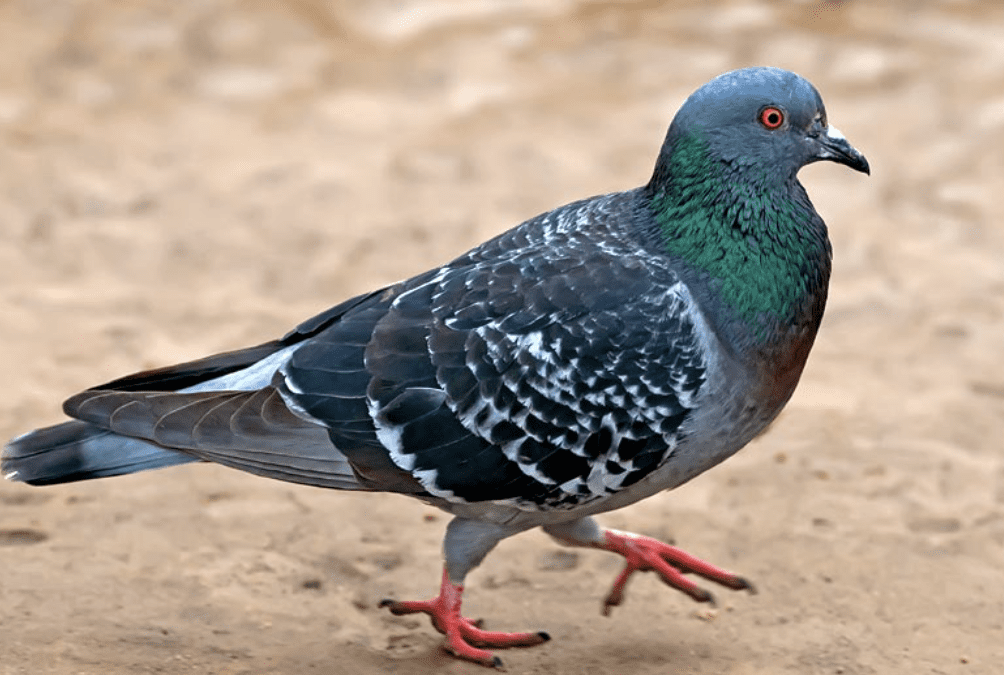
by Pigeon Patrol | Jun 21, 2023 | Bird Spike, Pigeon Droppings, Pigeon Patrol's Services, Pigeon Predators, Pigeon Spikes, Pigeons
Pigeons can carry lice, ticks and disease-bearing mites, and their acidic droppings can damage your car’s paint and anything else it comes in contact with. To make matters worse, once your home becomes their favorite place to perch or nest, it takes some effort to get rid of them.
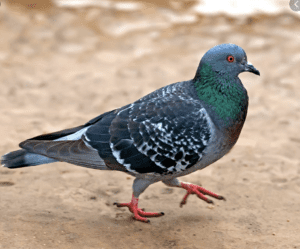
Luckily, you can encourage them to move somewhere else without causing them any harm. Here are 9 ways to get rid of pigeons if you have an infestation.
-
Make noise
An ultrasonic bird repeller discourages pigeons from landing on or near your house by emitting the sounds of their predators and bird distress calls. Because these sounds are ultrasonic, you won’t be able to hear them unless you turn the volume up to the highest setting. But, area pigeons will. While some pigeons will immediately leave your home after hearing the repeller, others will take time to associate your house with the noises and decide to roost elsewhere.
These devices start at about $50 and top out at $200, depending on how far they transmit the sounds (some can cover up to 5,000 square feet) and their features. On the downside, ultrasonic bird repellers don’t just repel pigeons. They can repel other animals, too, and can disturb your dog or cat.
-
Give them no place to roost
A common solution to a pigeon problem, bird spikes are thorn-like protrusions, usually made of plastic, that attach to a strip. When pigeons try to land, the spikes make it impossible to find a place to roost. Most homeowners install them to the roofline, but you can also install them on beams, window sills, ledges, fences and gates. You can purchase these at most home improvement and garden centers for $25 to $40 for a 7’ to 8’ strip.
Bird spikes are one of the most effective ways to get rid of pigeons because they can’t roost where there is no place for them. However, they can detract from your home aesthetically.
-
Be a bad host
Similar to bird spikes, bird wire runs 3” to 4” above the space where you don’t want pigeons to land. As a bird begins its descent, it contacts the wire, which will feel unsteady, and abort his landing. Over time, pigeons will determine your house isn’t a safe place to land and avoid it altogether.
To install bird wire, you’ll need thin, metal posts that attach to your roofline. Unfortunately, it’s not easy to find at home improvement stores or online, so you may have to hire a pest control company to install it for you.
-
Get a gel for that
Unlike bird wire, you can easily install bird repellant gel. This clear, sticky gel comes in a caulk tube that you apply to your roof, fence or wherever they perch. When a pigeon lands on the gel, it will sense its stickiness and leave. Each tube sells for about $15 to $20 and should cover about 10 to 12 feet.
It does have a few downsides. Bird repellant gel needs to be replaced at least annually and, as it collects dust, can become unsightly. On a more positive note, though, it’s virtually invisible and can reduce other pests, such as ants, which can get stuck in it.
-
Hang reflective tape
Another popular way to get rid of pigeons is to hang reflective scare tape, sometimes also called reflective bird tape or flash tape. Sold in rolls of up to 350 feet, this tape has a holographic pattern that interacts with light and disorients birds of all kinds. To use it, cut the tape into strips and hang them wherever you want to discourage the pigeons from landing.
Not only does the shiny “flash” from the tape fluttering in the breeze confuse and scare the pigeon but the sound of it moving upsets them, too. Some people don’t like the look of reflectors, but for less than $15 for 350 feet, it may be worth it.
-
Surprise them with a little sprinkle
Good for all types of pests, including skunks and raccoons, a motion-activated sprinkler scares pigeons away with a combination of sound and water whenever it detects motion. Once activated, it will blast water in the direction where motion was detected for 5 seconds. Most cost between $50 and $75 and can be customized to work only at certain times of the day. After its program, all you have to do is attach it to a hose.
These systems do have a drawback, though, in that they can’t tell the difference between a pigeon, your dog or the neighbor’s kid. If pets or other people routinely walk within the perimeter specified on the water jet’s packaging, you might want to consider using a different method.
-
Get an owl decoy
Pigeons want to avoid their predators just as much as any other bird. Use a frightening decoy to your advantage. Owl decoys work well to deter pigeons. You can find them at most home improvement and garden centers, and they can range from simple decoys with heads that rotate in a breeze to solar-powered ones that emit “hoots” and flap their wings.
Since most weigh very little, you’ll want to secure the base so it doesn’t tip over. And, although decoys are designed to withstand the elements, over time, you may need to clean the sensor on yours or replace the decoy outright. Another possible concern is decoys can deter other birds and smaller animals, like squirrels, from visiting your yard.
-
Lure them with bait
If you don’t have many pigeons to deal with, a pigeon trap may do the trick. Specifically designed for pigeons, these traps can accommodate up to 10 live birds. To use one, place fruit, seeds, cracked corn or other treats inside. When a bird enters through the one-way door to eat, it will close behind him, and he won’t be able to get out. Once you have trapped the birds, you can drive them far from your house and release them.
Traps generally cost between $75 and $100, but those with extra features, like shade covers or water dispensers, will cost more. The good news is they’re effective when you’re contending with a few birds; the bad, they don’t work well for infestations.
-
Be proactive
As creatures of habit, pigeons return to the same place over and over unless you give them a reason not to. While most of the above methods scare them away, you can also remove the things that first attracted them there. Cover all trash cans, pet food and standing water, like birdbaths. Put netting over fruit trees and your garden plants. And don’t overseed your grass or set out other seeds.
It also helps to seal off any gaps in your roof shingles, cap vents and chimneys, and fill any holes where they might nest. These steps will make your home less attractive and may encourage them to find another place with access to berries and places to make a nest.
Extra help
You’ll want to get your pigeon problem under control quickly if you plan to show your house or if you move into a new home with an infestation. In those cases, consider hiring a professional pest control company that will find the right solution for your unique situation.
Source
Pigeon Patrol Products & Services is the leading manufacturer and distributor or bird deterrent (control) products in Canada. Pigeon Patrol products have solved pest bird problems in industrial, commercial, and residential settings since 2000, by using safe and humane bird
deterrents with only bird and animal friendly solutions. At Pigeon Patrol, we manufacture and offer a variety of bird deterrents, ranging from Ultra-flex Bird Spikes with UV protection, Bird Netting, 4-S Bird Gel and the best Ultrasonic and audible sound devices on the market today.
Voted Best Canadian wholesaler for Bird Deterrent products ten years in a row.
Contact us at 1 877-4-NO-BIRD,(604) 585-9279 or visit our website at www.pigeonpatrol.ca
Pigeon/Pigeon Patrol / Pigeons Roosing / Vancouver Pigeon Control / Bird Spikes / Bird Control / Bird Deterrent / PIgeon Deterrent / Surrey Pigeon Control / Pest / Seagull deterrent / Vancouver Pigeon Blog / Birds Inside Home / Pigeons in the cities / Ice Pigeons / What to do about pigeons / sparrows, Damage by Sparrows, How to Keep Raccoons Away, Why Are Raccoons Considered Pests / De-fence / Pigeon Nesting / Bird Droppings / Pigeon Dropping / woodpecker control / Professional Bird Control Company / Keep The Birds Away / Birds/rats/seagull/pigeon/woodpecker/dove/sparrow/pidgeon control/pidgeon problem/pidgeon control/flying rats/pigeon problems/ bird netting/bird gel/bird spray/bird nails/bird guard










